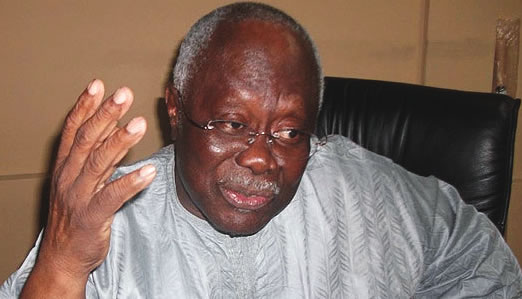Former Deputy National Chairman (South-West) of the Peoples Democratic Party (PDP), Bode George, has publicly voiced his disappointment regarding the allegiance shown by former Governor of Ekiti State, Ayo Fayose, and the Minister of the Federal Capital Territory, Nyesom Wike, towards the ruling All Progressives Congress (APC). Specifically, Fayose has pledged support for Governor Biodun Oyebanji of the APC, whilst Wike has expressed no regrets about his support for President Bola Tinubu’s administration. George articulated his sentiments during an appearance on Channels Television’s “Politics Today,” condemning their actions as damaging to the PDP’s image in the eyes of the Nigerian electorate.
George criticized Fayose’s apparent abandonment of party loyalty, emphasizing that it is unacceptable for a two-term governor to openly align with the opposition party. He argued that such actions warrant a closer investigation within Ekiti State to gauge the sentiments of party members on this betrayal of trust. Additionally, George expressed concern that this behavior undermines the PDP’s credibility and cohesion, as party membership should prioritize loyalty and collective strength rather than creating discord with public endorsements of rival parties.
In relation to Wike’s actions, George, while disapproving, expressed a belief in the possibility of reconciling internal party conflicts. He urged that grievances should be handled discreetly within the party structure, rather than airing them publicly, as this not only tarnishes the party’s reputation but also complicates efforts to regain voter confidence. He used a metaphor of family disputes, suggesting that members should not air their grievances in public forums; instead, they should work toward resolving issues internally to present a united front to the electorate.
Furthermore, George criticized the APC, stating that he sees no superiority in their governance or policies compared to the PDP, even in its current crisis-ridden state. He described the APC as a coalition of “strange bedfellows,” implying that its members may lack cohesive ideologies and objectives. George’s comments reflect his belief that despite PDP’s internal problems, it remains a more viable option for voters than the APC, which he suggested has its own management issues, exemplified by the struggles of party leaders like Ganduje.
George’s discourse highlights a broader concern about party loyalty and the challenges political parties face within Nigeria’s dynamic political environment. The actions of Fayose and Wike may symbolize deeper rifts not only within the PDP but also in how political allegiances can shift based on individual ambitions, highlighting the need for introspection and unity among party members to curb defections and loss of public support.
In conclusion, Bode George’s interview sheds light on the challenges faced by the PDP as it grapples with disloyalty from key figures and seeks to navigate its identity and direction. His poignant remarks underline the importance of solidarity within political parties, particularly as Nigeria moves toward future elections. It is clear that maintaining a cohesive party image is critical, and George’s call for introspection serves as a reminder for members to prioritize collective interests over personal ambitions to secure the party’s relevance in the political landscape.


